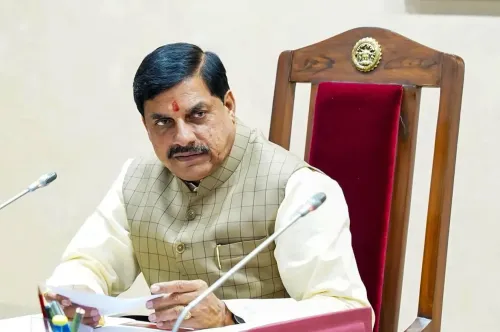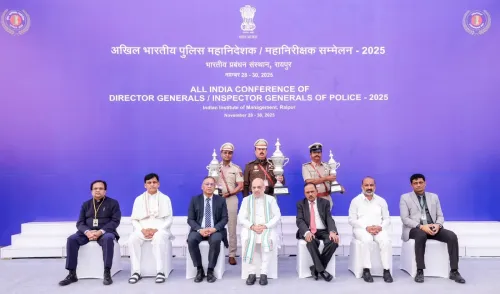Why Have 24 Airports Been Closed Amid India-Pakistan Tensions?

Synopsis
Key Takeaways
- 24 airports across India are temporarily closed due to security concerns.
- Increased security measures include Secondary Ladder Point Checks for passengers.
- Airlines recommend arriving at least three hours before departure.
- Heightened security protocols are a response to recent attacks.
- Collaboration between airlines and national security agencies is crucial.
New Delhi, May 9 (NationPress) The Civil Aviation Ministry has announced the temporary closure of 24 airports nationwide for civil flight operations as of Thursday evening. This decision comes amidst rising tensions between India and Pakistan, exacerbated by a recent drone and missile attack from Pakistan targeting Indian cities in Jammu, Punjab, Gujarat, and Rajasthan.
In light of the growing threat, several Indian airlines have issued travel advisories, asking passengers to plan ahead and comply with heightened security measures.
The Ministry has not indicated how long these closures will last or the specific reasons behind them.
This action is part of a larger security protocol, with many affected airports situated near the international border or in strategically important locations.
These flight suspensions will likely disrupt connectivity in northern and western India. Travellers are advised to consult with airlines before going to the airport.
The Bureau of Civil Aviation Security (BCAS) has called for all airlines and airports nationwide to bolster security protocols.
Passengers will undergo a Secondary Ladder Point Check (SLPC), commonly known as pre-boarding inspections, at all airports. Vehicles will be meticulously checked at airport terminals, ID verification will occur prior to entry, and passenger luggage will be randomly inspected. Visitor access to terminal buildings is currently prohibited, and Air Marshals will be deployed as needed.
In light of the recent attack in Pahalgam and the heightened security climate, BCAS has mandated enhanced security measures at all civil aviation facilities, including airports, airstrips, airfields, air force stations, helipads, flying schools, and aviation training institutions, to prevent any untoward incidents.
Air India stated, "Due to an order from the Bureau of Civil Aviation Security regarding increased security measures at airports, we encourage passengers nationwide to allocate extra time for check-in and boarding. Check-in will close 75 minutes before departure."
Akasa Air echoed this sentiment, advising on X, "Due to enhanced security measures at all airports in India, passengers should arrive at least three hours prior to their flight. This is to ensure a seamless check-in and boarding experience."
"Passengers must present valid government-approved photo IDs for airport entry. In addition to checked baggage, only one handbag weighing up to 7 kg will be allowed. All passengers will undergo secondary security checks prior to boarding."
IndiGo, the largest airline in India, also issued a statement, "During these extraordinary times, heightened security measures are being enacted at all airports. We advise travellers to allow additional time for their journeys to accommodate security checks and procedures. Your understanding and cooperation are appreciated."
Given the current unpredictable geopolitical landscape, aviation officials and airline personnel are collaborating with national security agencies to manage operations and ensure passenger safety.
In reaction to the increased tensions with Pakistan, Indian airlines have halted operations at over two dozen airports in the northern and western parts of the country this week.
Several states have also enacted school closures, blackouts in border districts, and a suspension of leave for police officers and administrators.
"Pakistan escalated the situation, and we merely retaliated. The choice lies with Pakistan. Our stance is not to escalate; we only responded to the terror attack in Pahalgam on April 22," Foreign Secretary Vikram Misri remarked at a briefing on Thursday evening.









